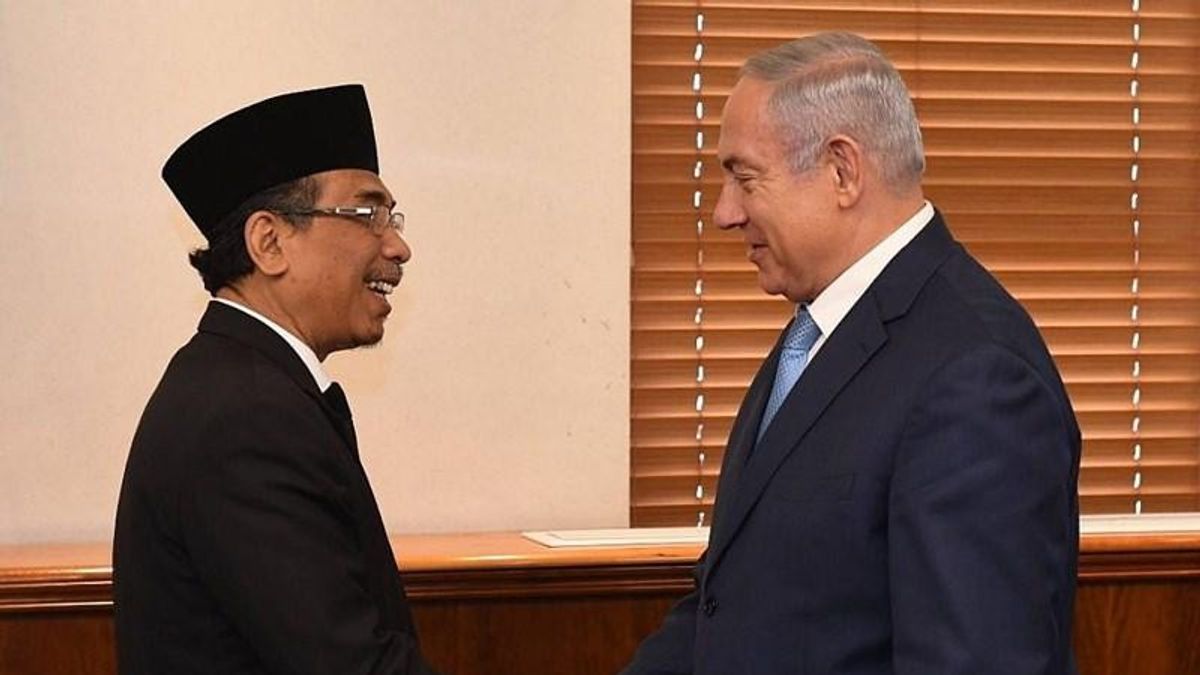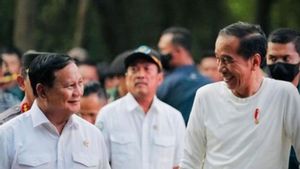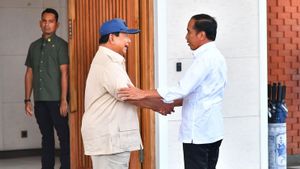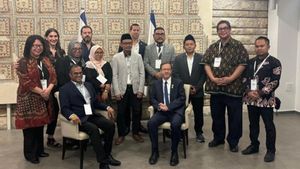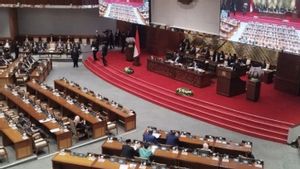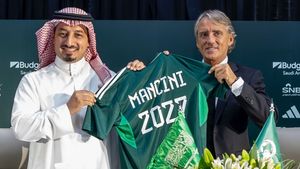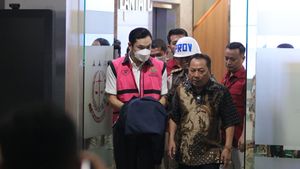JAKARTA News related to hate relations but longing between Indonesia and Israel until mid-2024 was so busy surfing various media platforms. Starting with the rejection of the Israeli U-20 football team which resulted in the cancellation of the 2023 U-20 World Cup in Indonesia.
Then there is the Israel-Hamas war, Indonesia's desire to join the Organization for Economic Co-Operation and Development (OECD), to visit NU cadres to the Jewish State and meet President Isaac Herzog.
All of that is actually twisted, but it's like compiling a puzzle we have to be patient in stringing it together. Until finally it becomes a complete form.
Although it does not seem intact at this time, it is unclear that there is an attempt to normalize relations between Indonesia and Israel. Efforts that seem very heavy and winding, but success towards that direction is not impossible.
On April 11, news emerged at The Jerusalem Post calling on the international community. The title of the news is: Indonesia to Normalize Ties with Israel amid OECD Membership Bid, Indonesia will Normalize Relations with Israel amid the OECD Membership Efforts.
"The potential normalization of these relations arises, because it is one of the conditions provided by OECD if Indonesia wants to join the international economic organization," wrote The Jerusalem Post.
Israeli Foreign Minister, Israel Katz has frankly rejected Indonesia's efforts to become the 39th member of the OECD, except for showing gestures to accept the requirements for normalizing relations.
Israel is one of 38 OECD member states, an organization formed in Paris, France on September 30, 1961. The Jewish country together with Japan and South Korea are Asian countries that are members of it. OECD requires that each member state must have diplomatic relations.
"I am pleased to confirm that the Council has officially approved clear and explicit prerequisites that diplomatic relations must be built by all OECD member countries, before the decision to accept Indonesia as a member is taken," said OECD Secretary General Mathias Cormann in an official letter to Israel dated March 26, 2024.
Israel answered through the official letter of Foreign Minister Katz addressed to Cormann.
I have the same hope as you, that this process will be a transformative process for Indonesia. I look forward to positive changes in Indonesia's policy in general, especially towards Israel. Especially policy changes that are discriminatory to Israel, and the formation of bilateral diplomatic relations," Katz replied in an official letter dated April 10, 2024.
OECD is often referred to as the club of rich countries', notably for driving global economic growth, trade and social welfare through market liberalization. Joining the OECD is seen as a strategic step to put Indonesia on track towards economic prosperity.
It is common if every newcomer to the elite social club must comply with certain standards. Long-standing members play an important role in ensuring compliance with the rules, through a mechanism of pressure and law enforcement.
Therefore, compliance with the OECD review will have a major impact on Indonesia's political and economic systems. Understanding Indonesia's motivation to join OECD is a very important point.
Professor of Political Sciences and International Relations from Harvard University, Christina L. Davis in her paper More than Just a Rich Country Club: Membership Conditionality and Institutional Reform in the OECD, 26 June 2016, mentions two main reasons a country is interested in joining OECD.
First, providing tangible economic benefits. OECD membership can increase investor confidence and attract foreign investment, which will ultimately create jobs and accelerate economic growth.
Second, more than just an economic problem, joining the OECD also raises the status of a rich group of countries. OECD membership provides increased status and acceptance in the international community. This strengthens perceptions about common ideas, is mutually beneficial, and is seen as an important player in global interaction.
Indonesia is working hard to achieve development targets in the 2045 Golden Indonesia Vision. In the 2025-2045 Long-Term Development Plan, Indonesia wants to achieve a 6-7 percent economic growth rate per year and exit the middle-income trap. In essence, Indonesia aspires to become a high-income country in the next two decades.
Coordinating Minister for the Economy Airlangga Hartarto was given the opportunity to make a speech at the OECD Ministerial Meeting in Paris, on May 2. Airlangga is also tasked with guiding discussions about the possibility of Indonesia joining the organization.
Airlangga is certain to understand the requirements given by OECD, if Indonesia wants to join as a member of the 39th.
"We are talking about sustainable development, and also related to Indonesia's environmental programs, related to the energy transition, and related to Indonesia's future achievements to build an environmentally friendly economy," said Airlangga, in a statement quoted by VOI on May 4.
The desire to join the OECD was confirmed by the Daily Executive (Plh) statement of Deputy IV of the Coordinating Ministry for Economic Affairs, Musdhalifah Machmud. Musdhalifah said that Indonesia currently has a target to be included in the OECD membership.
To achieve this target, Indonesia must have an income of around 28,000 to 33,000 US dollars. Meanwhile, until now Indonesia is only around 4,900 US dollars. Indonesia is the first Southeast Asian country to become a candidate for OECD member and has been an important partner since 2007 with Brazil, China, India, and South Africa.
The idea of normalizing relations with Israel is actually nothing new for Indonesia. Starting with the 4th President of the Republic of Indonesia, Abdurrahman Wahid, who made the idea. Gus Dur reasoned that without building diplomatic relations with Palestine and Israel, Indonesia would not be able to play a role in realizing peace between the two countries.
The general chairman of PB Nahdlatul Ulama, Yahya Cholil Staquf, also met with Israeli Prime Minister Benjamin Netanyahu in Jerusalem on June 14, 2018. The meeting received criticism from many parties, especially Palestinians who strongly condemned it through his foreign ministry.
The Jerusalem Post on January 11, 2022, submitted a report entitled How Agriculture Led to Indonesia's Defense Minister to Talk Normalization with Israel. The content of the news is about Defense Minister Prabowo Subianto's efforts to discuss the normalization of diplomatic relations with Israel, which is wrapped in packaging over agricultural technology.
Indonesia has actually secretly built relations with Israel, in every way. Starting from agriculture, health, medicine, to defense. During the COVID-19 pandemic, Israel contributed 15,000 bottles of Taffix, an Israeli-made anti-COVID drug used by inhale. The assistance was received by Coordinating Minister for Maritime Affairs Luhut Binsar Pandjaitan, and distributed to health workers and military personnel.
The risks that must be faced by Indonesia if it openly opens diplomatic relations with Israel are indeed various. Normalization will clearly disrupt Indonesia's relations with Muslim countries that are still against Israel.
Normalization can also be seen as an effort to weaken Indonesia's attitude as an anti-colonialism and imperialism country. Indonesia has historically played an important role in the Asia Africa Conference and the Non-Aligned Movement, as supporters of developing countries.
Opening diplomatic relations with Israel will be seen as a deviation of historical roles. It also has the potential to degrade Indonesia's position in the eyes of developing countries, while reducing the reach of diplomacy with them.
SEE ALSO:
The decision to normalize relations with Israel cannot only be based on strategic calculations, but is also an effort to realize peace and justice in the Middle East. If Indonesia is forced to change its foreign political policy, the decision-making process must be carried out inclusively and transparently. The decisions taken must be a reflection of the collective values and will of the Indonesian people.
The English, Chinese, Japanese, Arabic, and French versions are automatically generated by the AI. So there may still be inaccuracies in translating, please always see Indonesian as our main language. (system supported by DigitalSiber.id)
